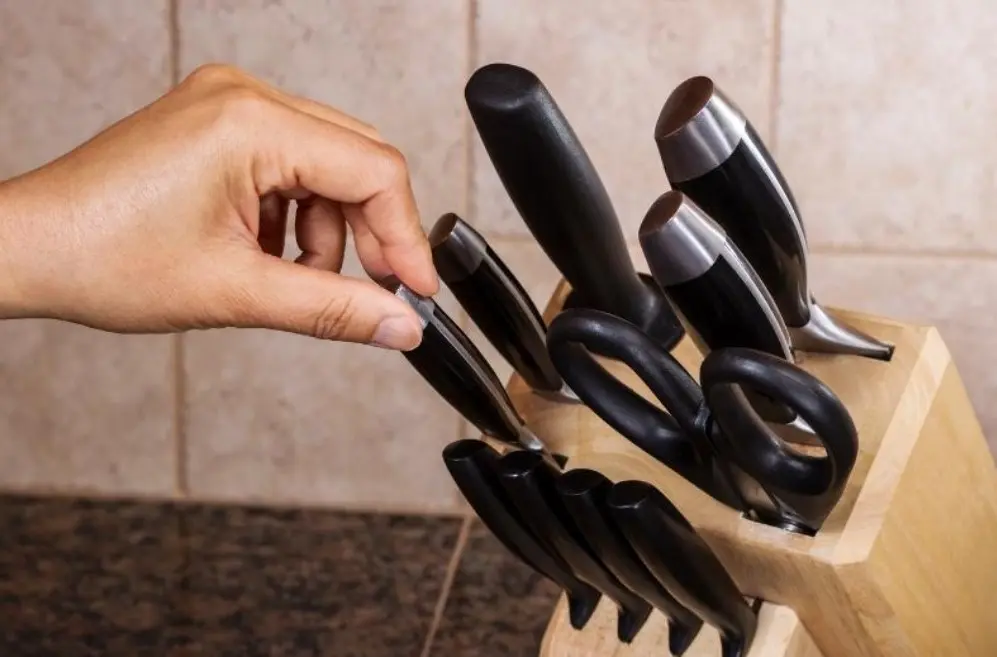Cleaning your kitchen knives right after use prevents food from drying on the blade. Dried food can be difficult to remove and may cause corrosion. Use warm water, mild dish soap, and a soft sponge to clean the knife. Avoid abrasive scrubbers that may scratch the surface. Be gentle while washing to prevent accidental cuts. Always hold the german knives by the handle and clean the blade in a direction away from your fingers. Never leave knives soaking in water, as this can damage the handle and increase the risk of injury when reaching into the sink. Proper cleaning ensures your knives remain in good condition for a long time.
Avoid Using the Dishwasher
Many people put their kitchen knives in the dishwasher, but this is a big mistake. The high heat, powerful water jets, and detergent can dull or damage the blade. Additionally, knives can knock against other utensils, causing nicks and scratches. The dishwasher also exposes wooden handles to excess moisture, which can lead to cracking and warping. Instead, always hand wash your knives for sale with care. Dry them immediately after washing to prevent rust and stains. If you want your knives to stay sharp and last longer, avoid the dishwasher completely. Hand washing may take extra time, but it is the best way to preserve your knives’ performance.
Dry Knives Thoroughly to Prevent Rust
After washing your knives, drying them immediately is crucial to avoid rust. Even stainless steel knives can develop rust spots if left wet. Use a soft, absorbent towel to dry the blade and handle completely. Pay special attention to the area where the blade meets the handle, as water can accumulate there. For extra protection, you can air dry the knife for a few minutes before storing it. Moisture is the enemy of any kitchen knife, so always make sure your knives are completely dry before putting them away. This small habit can significantly extend the life of your knives.
Store Knives Properly to Avoid Damage
Proper storage keeps your kitchen knives sharp and safe. Storing them loosely in a drawer can cause damage to the blades and increase the risk of accidental cuts. Instead, use a knife block, magnetic strip, or protective sheath. A knife block keeps blades separated and prevents them from rubbing against each other. Magnetic strips offer easy access and save counter space. If you must store knives in a drawer, use blade guards to protect the edges. Proper storage not only maintains the sharpness of your knives but also keeps your kitchen organized and safe.
Use the Right Cutting Surface
The cutting board you use can affect the lifespan of your knife. Hard surfaces like glass, granite, or ceramic can quickly dull the blade. Instead, choose cutting boards made of wood or plastic, which are gentler on the knife’s edge. Wooden boards are ideal because they naturally absorb bacteria and are durable. Plastic boards are easy to clean and maintain. Avoid cutting directly on countertops, as this can damage both the knife and the surface. Using the right cutting board helps keep your knives sharper for longer, reducing the need for frequent sharpening.
Sharpen Your Knives Regularly
A sharp knife is safer and more efficient than a dull one. Regular sharpening keeps your knife performing at its best. You can use a whetstone, honing rod, or professional sharpening service. A honing rod helps maintain the edge between sharpenings, while a whetstone restores the sharpness of a dull blade. If you’re unsure how to sharpen your knife properly, consider getting professional help. Sharpening your knives every few months ensures they remain effective for cutting and chopping. Keeping your knives sharp improves your cooking experience and reduces the risk of accidents.
Avoid Cutting Hard or Frozen Foods
Using your kitchen knife on extremely hard foods can damage the blade. Avoid cutting through frozen foods, bones, or thick-skinned vegetables like pumpkins with your regular kitchen knife. Instead, use a cleaver or a specialized knife designed for heavy-duty tasks. For frozen foods, let them thaw slightly before cutting. Applying too much force on a knife not meant for hard items can lead to chipping or bending of the blade. Always use the right tool for the job to prevent unnecessary wear and tear on your kitchen knives.
Oil the Blade for Extra Protection
Occasionally oiling your kitchen knife can help protect it from rust and corrosion. This is especially useful for high-carbon steel knives, which are more prone to rust than stainless steel ones. Use food-safe mineral oil or a light cooking oil to coat the blade lightly. Apply a small amount using a clean cloth and wipe off any excess. This simple step creates a protective barrier against moisture and keeps your knife in top condition. Regular oiling is an easy and effective way to maintain the longevity of your favorite kitchen knives.
Handle Knives with Care to Prevent Damage
Proper handling of your kitchen knives is essential for their longevity. Avoid dropping them or using them to open cans, pry lids, or perform other non-cutting tasks. Misuse can lead to broken tips, bent blades, or handle damage. Always use your knives only for their intended purpose—cutting food. When passing a knife to someone, place it on the counter for them to pick up safely instead of handing it directly. Taking care when handling your knives prevents damage and ensures they remain in excellent working condition for years.
Also Read-How PCB Design and Assembly Drive Technological Innovation
